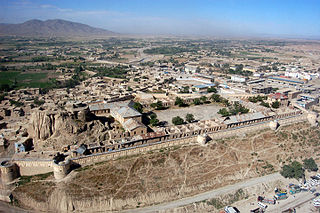
Paktia is one of the 34 provinces of Afghanistan, located in the east of the country. Forming part of the larger Loya Paktia region, Paktia Province is divided into 15 districts and has a population of roughly 623,000, which is mostly a tribal society living in rural areas. Pashtuns make up the majority of the population and a small percentage include Tajiks. Gardez is the provincial capital. The traditional food in Paktia is known as (dandakai) which is made from rice and mung bean or green gram.
Operation Magistral was a Soviet Army military operation during the Soviet–Afghan War that began in late November 1987 and ended in early January 1988.
During the nine-year Soviet–Afghan War in the 1980s and the subsequent Afghan civil war, the town of Khost was besieged for more than eleven years. Its airstrip's 3 km runway served as a base for helicopter operations by Soviet forces.
Bäk is a village in Khost Province, Afghanistan and the center of the boundary Bak District, close to the border with Pakistan. It is located on 33.5°N 70.05°E at 1137 m altitude.
Sekhamir Kalay is a village and the center of Gurbuz District, Khost Province, Afghanistan. It is located at 33.2875°N 69.9125°E at 1,207 m altitude in the northwestern part of the district.
Ḍaḍwāl is a village and the center of Ismailkhel and Mandozai District in Khost Province, Afghanistan. It is located on 33.3103°N 69.7992°E at 1267m altitude on south side of Shamal river, it is connected to north a village Aliwat by a bridge which constructed by US army (PRT). The villagers are mostly educated and trained in different jobs. There is girls high school.
Musakhel is a village and the center of Musakhel District, Khost Province, Afghanistan. It is located at 33.5333°N 69.7333°E at 1835 m altitude. The town is located within the heartland of the Ahmadzai tribe of Ghilji Pashtuns.

Nadir Shah Kot District is situated in the western part of Khost Province, Afghanistan. It borders Paktia Province and Shamal District to the west, Qalandar District to the north, Musa Khel District to the northeast, Khost (Matun) District to the east, Mandozayi District to the southeast and Tani and Spera districts to the south.
Qalandar District is situated in the western part of Khost Province, Afghanistan. It borders Paktia Province to the west, Musa Khel District to the north and east and Nadir Shah Kot District to the south. The population is 9,100 (2006). The district center is the village of Khost Mela33.5150°N 69.6778°E.

Sabari & Yaqubi District is situated in the northwest part of Khost Province, Afghanistan. It borders Musa Khel District to the west, Paktia Province to the north, Bak District to the east and Tere Zayi and Khost districts to the south. Sabari & Yaqubi District has its own governor, who is appointed by the serving governor of Khost Province, and the Afghan National Security Forces (ANSF) are responsible for all law enforcement activities.
Yaqubi is the center of Sabari District in Khost Province, Afghanistan. It is located on 33.4608°N 69.99°E at 1,113 m altitude in the southeastern part of the district.
Spera is a village and the district center of Spera District, Khost Province, Afghanistan. It is located on 33.2022°N 69.5161°E at 1,790 m altitude. The town is located within the heartland of the Zadran tribe of Pashtuns. During the US occupation of Afghanistan, Spera sat along a highly used smuggling route from Pakistan into Afghanistan. The area was known to harbor many ex members of both the Taliban and the Al Qaeda.
Tani District is situated in the southern part of Khost Province, Afghanistan. Where most of Shitakzai Taniwal or Tani live. It borders Spera District to the west, Nadir Shah Kot and Mando Zayi to the north, Gurbuz District to the east and Pakistan to the south. The population is 52,800 (2006) people. The district center is the village of Tani, situated in the northeastern part of the district.
Shitak or Shitakzai (Tani or Taniwal) (also: Daragi) is a village and the center of Tani District, Khost Province, Afghanistan. It is located on 33.2422°N 69.8281°E at 1,303 m altitude. In This District Shitak or Shitakzai (Tani or Taniwal) Tribe Reside a Karlani Pashtuns & Their Brother Tribes of Shitakzai is (Bannuchi or Bannuzai who is Currently Reside in Bannu District Khyber Pakhtunkwa Pakistan) Shitakzai (Dawar or Dour who is Currently Reside in Tochy valley of Wazirstan Pakistan)
Ali Shir is the center of Tere Zayi District in Khost Province, Afghanistan. It is located on 33.4658°N 70.0911°E at 1,070 m altitude.
Shamal is the center of Shamal District, Khost Province, Afghanistan. It is located at 33.3114°N 69.5478°E at 1581 m altitude in the eastern part of the district. The town is located within the heartland of the Kharoti tribe of Pashtuns.

Ayub Kheyl is a small village 11 km outside Khost, Afghanistan. It was the site on July 27, 2002, of a firefight by US soldiers, assisted by Afghan militia, against militants in the village. After the fight, the Americans captured the wounded 15-year-old Omar Khadr, who they learned was a Canadian citizen. He was among the youngest persons detained at Guantanamo Bay detention camp and the last Western citizen held there.
Qila Niazi is a village located near kabul Afghanistan. It is about 135 kilometres (84 mi) south of Kabul.

The Khost-Gardez Pass, frequently abbreviated as the K-G Pass, and known locally as the Seti-Kandow Pass, or the Satukandav Pass by Soviet forces, is the main land route connecting Khost, the capital of Khost Province, and Gardez, the capital of Paktia province, in eastern Afghanistan. The pass currently consists of a rutted dirt road, though it is slowly being improved by construction crews as part of the international reconstruction effort in Afghanistan.

The Khost suicide bombing occurred on 12 July 2015 in Khost Province when a suicide bombing killed at least 33 people, including 12 children and another 10 people were wounded.






